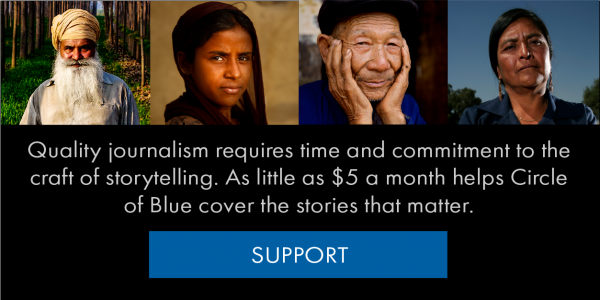The Stream, August 7, 2019: Quarter of Earth’s Population Faces Extreme Water Stress, Report Shows
The Global Rundown
Data published by the World Resources Institute shows that a quarter of the earth’s population is close to running out of water. Kalamazoo, Michigan, receives a $1.6 million grant to aid residents with PFAS-contaminated wells. Water ministers in Australia agree to let an independent party investigate allegations of water-theft in the Murray-Darling Basin. Hydropower blackouts worsen in drought-hit Zambia and Zimbabwe. Experts question water sustainability in the booming desert city of Riyadh, Saudi Arabia.
“In Saudi Arabia there are only two sources of water: the sea and deep wells. We’re in the central region, so there are only deep wells here.” –Ahmed Safar Al Asmari, who manages one of the Berain water factories in Riyadh, Saudi Arabia. Data shows that Saudi Arabia may have only 13 years of groundwater reserves left, a possibility that is especially concerning in inland areas like Riyadh, the capital city. The country is working on desalination and other projects, but officials say another key issue is the kingdom’s high per capita water consumption, which is double the world average. The Guardian
Latest WaterNews from Circle of Blue
HotSpots H2O: Taps Run Dry for Millions in Zimbabwe’s Capital — Half of residents in Zimbabwe’s capital are without municipal drinking water as drought and inadequate infrastructure parch the city of some 4.5 million people.
What’s Up With Water – August 5, 2019 — This week’s edition of What’s Up With Water includes coverage on low water levels in the Mekong River, nitrates in groundwater in Germany, and water pollution from hand grenades at a U.S. military base.
By The Numbers
$1.6 million Amount of a grant that the Kalamazoo City Commission received from the Michigan Department of Environment, Great Lakes and Energy (EGLE). The funds will be used to aid residents in Cooper and Richland Townships, where PFAS contaminants were detected in wells. MLive
23 percent Current capacity of the Kariba Dam, which provides hydropower to Zambia and Zimbabwe. At this time last year, the dam was at 85 percent capacity, but months of drought could now force Kariba to cut output completely. The next rainy season is supposed to start in October or November, but forecasts show it may be later. Bloomberg
In context: HotSpots H2O: Taps Run Dry for Millions in Zimbabwe’s Capital.
Science, Studies, and Reports
An analysis published by the World Resources Institute this week warns that a quarter of the world’s population faces severe water stress. The report shows that 17 countries, plus 33 cities with populations of more than 3 million people, are facing extremely high water stress. The number of extremely-stressed cities is expected to rise to 45 within the next decade. The New York Times
On the Radar
The Australian states of New South Wales, Victoria, South Australia, Queensland and the Australian Capital Territory agreed to an independent inspector general to review allegations of water-theft in the Murray-Darling Basin. The inspector general will also police future management of the plan. The Guardian
Kayla Ritter is a recent graduate of Michigan State University, where she studied International Relations and Teaching English to Speakers of Other Languages. She is currently based in Manton, Michigan. Kayla enjoys running, writing, and traveling. Contact Kayla Ritter







Leave a Reply
Want to join the discussion?Feel free to contribute!